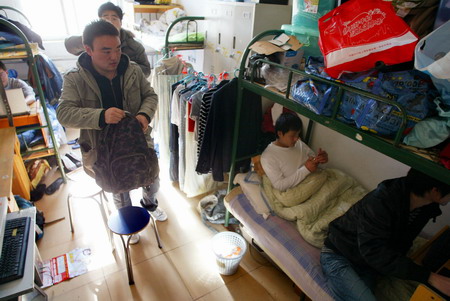City 'ants' scratch to endure in big cities
Updated: 2011-07-17 15:26
(Xinhua)
|
|||||||||||
|
 Several young men share a rented home in Tangjialing, one of the densely populated areas in Beijing where the ant tribes live, in this file photo taken in November 2009. [File photo / China Daily] |
BEIJING - Despite sharing a bed with two roommates in a 6-square-meter bedroom, Han Cheng doesn't complain about his living conditions in Xiaoyuehe, an urban village just two bus stops away from the Beijing Olympic Park near the north Fourth Ring Road.
The 21-year-old just quit his job in telemarketing. He could no longer bear the pressure of calling strangers and attempting to persuade them to sell their iPhone 4s and being refused hundreds of times every day. He says two of his colleagues are suffering from depression.
A graduate of Nankai University of business administration, Han came to Beijing in April as an intern and quickly found the job, which unfortunately, quickly proved to be disappointing.
"This room costs 500 yuan ($77) a month, or a third of my salary, but it's the only one I can afford that's not too far from downtown," Han said.
Han typifies many low-income graduates who have been forced into the fringes of China's big cities to scratch and scrape to make a living.
These young people are called China's "ant tribe," a term coined by sociologist Lian Si, who wrote a book about the post-80s generation graduates who crowd together in cramped cubicles across the country's big cities with their middle-class ambitions and devaluated diplomas.
There are an estimated 100,000 ant people living in Beijing and more than 1 million nationwide, according to Lian's survey from 2009 to 2010.
"This year, the number of ant people is growing bigger," Lian said. "Their average salary remains less than 2,000 yuan, but the cost of living has risen enormously because of inflation."
According to a report released by the Ministry of Human Resources and Social Security in February, more than 6.6 million college graduates among 24 million job seekers rush to job fairs in June and August to compete for 12 million jobs.
"An old Chinese proverb says a man is supposed to be economically independent at the age of thirty, but according to our 2010 survey, we found that many of these ant people leave the big cities after three to five years of struggle without any improvement in their living standards and no career in sight," Lian said.
The transition from a rural setting to a bustling, competitive urban environment may be too much of an adjustment.
"Most of these ant people are from rural families or small towns, and their experiences in universities won't arm them well enough to compete in job markets in big cities," said Zhang Ming, a professor of politics at the Renmin University of China.
Zhang says the government should vigorously develop "second- and third-tier cities" to lure more graduates from big cities.
"I might go back to Tianjin, where the competition is not as fierce as in Beijing, if I can't find a suitable job soon," Han said.
Demolition won't help
Two years ago, Tangjialing was the most famous anthill for fresh graduates to gather, mostly because of its cheap rent and convenient commute to Zhongguancun, China's "Silicon Valley".
In December 2009, Tangjialing was among 50 residential areas in Beijing that were slated for large-scale renovation.
Officials with the Beijing municipal government hoped the project would improve integration between the urban and rural areas, stimulate the low-end housing market and improve living standards for rural workers.
"Tangjialing disappeared but more than 10 villages around it mushroomed overnight," Lian said. "Ant people moved to farther places, such as Shigezhuang and Huoying, places that are along the subway line 13 that go beyond the north Fifth Ring Road."
Sociologists argue that demolition will not solve the problem of ant people. As in the case of Tangjialing, they will flock into other villages in search of low-cost accommodation, even further away from the city's downtown.
Scholars suggest the government should loosen the requirements for the public rental housing application, yet more than 80 percent of ant people are from rural areas and small cities and are not qualified to apply without a Beijing hukou.
"As we learn from the history, grassroots intellectuals are the most likely to cause social turbulence," said Yu Jianrong, a sociologist with the Chinese Academy of Social Sciences.
Yu said the problems facing these young ant people call for sincere efforts by the government to build fair social security systems.
Value of happiness to change
College students who have not graduated also feel the pressure of a dim future.
Huang Songyuan, a junior at Beijing International Studies University, says she is preparing for the entrance exam for postgraduate studies in 2013. "If I have to work after graduation, I will go back to my hometown in Guangxi (in Southwest China) rather than stay in Beijing. It's much easier to make a living there," she said.
"Though we still believe that knowledge is power, it is not omnipotent," said Li Xixi, 20, a girl born in Beijing. "Some graduates survive the fierce competition and become city elite while others are disillusioned."
Lian says ant people are prone to equate happiness with career success, but happiness should be something that is more easily acquired.
He suggests young college students apply for internships during their sophomore or junior years and try to find their vocational interests before job seeking.
"When they have a goal, they should first split it up into different levels, then they would find it much easier to achieve their dreams, step by step," Lian said.